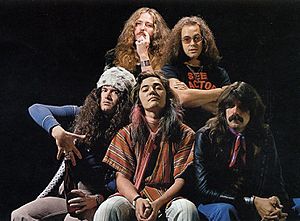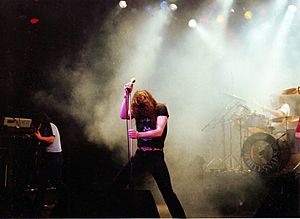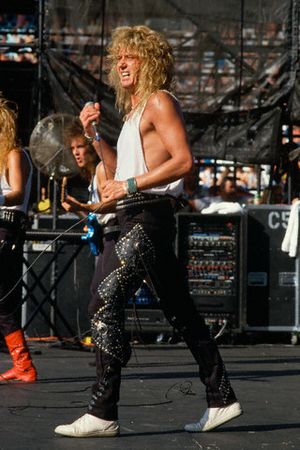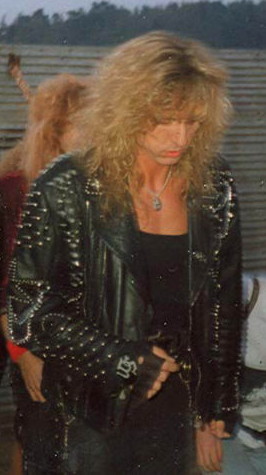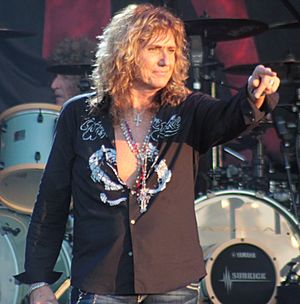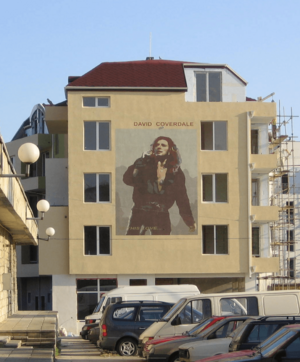David Coverdale facts for kids
Quick facts for kids
David Coverdale
|
|
|---|---|

Coverdale in 2015
|
|
| Background information | |
| Born | 22 September 1951 Saltburn-by-the-Sea, North Riding of Yorkshire, England |
| Genres | |
| Occupation(s) |
|
| Years active | 1966–present |
| Labels |
|
David Coverdale (born 22 September 1951) is an English singer and songwriter. He is most famous as the founder and lead singer of the hard rock band Whitesnake. He was also the lead singer for the band Deep Purple from 1973 to 1976. David Coverdale also had a successful solo music career.
Coverdale started Whitesnake in 1978. The band became very popular in the UK, Europe, and Asia. In 1987, Whitesnake released their album Whitesnake. This album included hit songs like "Here I Go Again" and "Is This Love". The album sold millions of copies and made the band famous in North America. When Whitesnake took a break from 1990 to 1993, Coverdale worked with Led Zeppelin guitarist Jimmy Page. They released an album called Coverdale–Page, which also sold very well.
In 2016, David Coverdale was added to the Rock and Roll Hall of Fame. He was honored as a member of Deep Purple. Coverdale is known for his strong, blues-style singing voice. Throughout his career, he has sold over 40 million records.
Contents
- Early Life and Musical Beginnings
- Music Career Highlights
- Joining Deep Purple (1973–1976)
- First Solo Albums (1977–1978)
- The Early Whitesnake Years (1978–1983)
- Whitesnake's Global Success (1984–1990)
- Coverdale and Page Collaboration (1990–1993)
- Whitesnake Returns and Restless Heart (1994, 1997–1998)
- Solo Album Into the Light (1999–2002)
- Whitesnake's Return (2003–Present)
- David Coverdale's Legacy
- Personal Life
- Discography
- See also
Early Life and Musical Beginnings
David Coverdale was born on 22 September 1951. His birthplace was Saltburn-by-the-Sea, in Yorkshire, England. His parents were Thomas Joseph and Winnifred May Coverdale. David shared that his mother's side of the family were singers. His father's side were artists who enjoyed painting and sketching.
David started learning music at his grandmother's house and at school. He began playing guitar and piano early on. However, drawing was his main way to express himself at first. From a young age, David showed a natural talent for singing. He found he could sing loudly and from his "gut."
Music Career Highlights
Joining Deep Purple (1973–1976)
David Coverdale began his music career playing with local bands. These included Vintage 67 (1966–1968), The Government (1968–1972), and Fabulosa Brothers (1972–1973). By 1973, he had finished art college. He was working as a singing salesman. Then, he saw an article in Melody Maker magazine. It said that Deep Purple was looking for a new singer. They needed someone to replace Ian Gillan.
Coverdale's old band, The Government, had played with Deep Purple in 1969. So, they knew each other. David sent a tape and auditioned for the band. He was chosen because of his singing and songwriting skills. The new bassist, Glenn Hughes, also sang vocals.
In February 1974, Deep Purple released their first album with Coverdale and Hughes. It was called Burn. The album quickly became very popular. In April 1974, Coverdale and Deep Purple played for over 200,000 fans. This was at the California Jam festival, David's first trip to the United States. In December 1974, they released another album, Stormbringer. This album had more funk and soul influences. Because of these changes, guitarist Ritchie Blackmore left the band in June 1975.
Coverdale helped convince the band to continue. They brought in American guitarist Tommy Bolin. The band released one more studio album with Bolin in 1975. It was called Come Taste the Band. This album was not as successful as their earlier ones. The tour that followed was also difficult. In March 1976, after a concert, Coverdale decided to leave. He was told there was no band left to quit. The other members had already decided to break up. The band's breakup was announced in July 1976. Coverdale later said he was scared to leave, but he wanted out.
First Solo Albums (1977–1978)
After Deep Purple broke up, David Coverdale started his solo career. He stayed true to his blues rock style. In February 1977, he released his first solo album. It was called White Snake. All the songs were written by Coverdale and guitarist Micky Moody. The music had influences from funk, R&B, and jazz. Coverdale later said this album was very personal. Even though it wasn't a big hit, its title inspired the name of his next band.
In 1978, Coverdale released his second solo album, Northwinds. This album had a "blues- and R&B-influenced hard rock" sound. It was much better received than his first album. Before this album came out, he had already formed a new band.
The Early Whitesnake Years (1978–1983)
After recording Northwinds, Coverdale quickly formed the band Whitesnake. Bernie Marsden and Micky Moody played guitar. At first, this band was just for touring Coverdale's solo album. But it soon became a full-time group. In early 1978, Whitesnake released an EP called Snakebite. This was later expanded into a full album, also titled Snakebite, released in June 1978.
For their next album, Trouble, Coverdale was joined by his former Deep Purple bandmate, keyboardist Jon Lord. For Whitesnake's 1980 album, Ready an' Willing, another Deep Purple member, drummer Ian Paice, joined. Ready an' Willing also had the band's biggest hit song at that time, "Fool for Your Loving". This song reached No. 13 on the British charts.
Ready an' Willing was followed by the even more successful album Come an' Get It in 1981. Coverdale put Whitesnake on hold in early 1982. He needed time to care for his sick daughter. When he felt ready to return, he reformed the band. They then released the album Saints & Sinners. In 1982, Coverdale was considered to be the singer for Black Sabbath. However, he chose to continue with Whitesnake instead.
Whitesnake's Global Success (1984–1990)
Whitesnake became very popular in the UK, Europe, and Asia. But they had not yet become famous in North America. In 1984, the album Slide It In started to get attention in the US. To help Whitesnake's sound and look, Coverdale brought in guitarist John Sykes.
In 1985, Sykes and Coverdale began working on new songs. However, Coverdale got a serious sinus infection. This made it almost impossible to record for much of 1986. Doctors even thought he might never sing again. Coverdale eventually got better, and recording continued. Before the album was fully released, Coverdale let Sykes go from the band. Coverdale said in interviews that this next album was very important for Whitesnake. If it wasn't successful, he would break up the band.
In 1987 and 1988, Whitesnake finally became a huge success in North America. Their self-titled album Whitesnake sold millions of copies. Hit songs like "Here I Go Again" and "Is This Love" helped. Music videos for songs like "Still of the Night" were played a lot on MTV. This made Whitesnake a major rock band in North America.
Through the late 1980s and early 1990s, Whitesnake continued to be very successful. This was despite many changes in the band's members. In 1989, Coverdale brought in Adrian Vandenberg to record a new album, Slip of the Tongue. Vandenberg co-wrote the whole album with Coverdale. But a wrist injury stopped him from playing lead guitar. Steve Vai was then brought in to finish the guitar parts. This album was also a success in Europe and the US.
On 26 September 1990, after a show in Tokyo, Coverdale decided to stop Whitesnake for a while. He was tired of the music business and touring. He also had personal challenges. Coverdale wanted to take a break and think about his career. He felt Whitesnake had become something he didn't want it to be. He said he got "caught up in it" and that the image part of music became "boring."
Coverdale and Page Collaboration (1990–1993)
In late 1990, David Coverdale met and started working with guitarist Jimmy Page from Led Zeppelin. Both musicians said this collaboration gave them new energy. They released an album called Coverdale–Page in March 1993. The album was a hit around the world. It reached number four in the UK and number five in the US. It also sold over a million copies in the US.
Tours for the album in Europe and the US were canceled. This was because not enough tickets were sold. However, they did a short tour in Japan in December 1993. After that, they went their separate ways. Jimmy Page soon started working with Robert Plant again.
Whitesnake Returns and Restless Heart (1994, 1997–1998)
In 1994, Coverdale put together a new version of Whitesnake. This was to tour and support the release of Whitesnake's Greatest Hits album. After this, Coverdale took another break from music for three years.
In 1997, Coverdale returned and released Restless Heart. Adrian Vandenberg played guitar on this album. It was originally meant to be Coverdale's solo album. But the record company decided to release it as "David Coverdale & Whitesnake." The tour for this album was called Whitesnake's farewell tour. During this tour, Coverdale and Vandenberg played two acoustic shows. One was in Japan and the other for VH1. The Japanese show was released as an album called Starkers in Tokyo the next year. After the Restless Heart tour ended, Coverdale stopped Whitesnake again and took another short break.
Solo Album Into the Light (1999–2002)
In 2000, Coverdale released his first solo studio album in 22 years. It was called Into The Light. The songs "Love is Blind" and "Slave" were released as singles. While the album wasn't a huge hit, it was his most successful solo album. The song "River Song" received a lot of attention. This album helped bring Coverdale back into the music world. In 2003, a collection of his early solo work was released. It was called The Early Years. This included his two solo albums from the late 1970s.
Whitesnake's Return (2003–Present)
In January 2003, David Coverdale brought Whitesnake back together. They went on an American tour with the Scorpions. The band members included Tommy Aldridge on drums, Marco Mendoza on bass, Doug Aldrich on guitar, Reb Beach (from Winger) on guitar, and Timothy Drury on keyboards. They also performed on the Rock Never Stops Tour that same year.
In April 2008, the band released their first new studio album in over 11 years. It was called Good to Be Bad and received great reviews. On 11 August 2009, Whitesnake played a show in Colorado. Coverdale suffered a vocal injury during this concert. After seeing a specialist, it was announced that he had severe vocal problems. The rest of the tour with Judas Priest was canceled to prevent further injury. In March 2011, the band released their 11th studio album, Forevermore.
In May 2015, the band released their 12th album, The Purple Album. This album featured new versions of songs that Coverdale had originally sung with Deep Purple. A tour followed to support the album. In May 2019, the band released their 13th studio album, Flesh & Blood.
In May 2022, Whitesnake began their farewell tour. This tour had been delayed due to the COVID-19 pandemic. European dates started in Dublin on May 10. However, they could only continue until their show in Croatia on July 2, 2022. The band had to cancel the last 11 dates of the European tour. This was due to health problems affecting various band members, including Coverdale himself. Whitesnake then canceled the entire 2022 North American part of their Farewell Tour. Coverdale needed to deal with ongoing breathing issues.
In 2024, a collection album was released. It was called Into the Light: The Solo Albums. This album included new mixes and remasters of all of Coverdale's solo albums.
David Coverdale's Legacy
In 2006, Hit Parader magazine named Coverdale as No. 54 on its list of the 100 Greatest Metal Vocalists of All Time. In 2009, he was voted sixth out of 40 singers for "the greatest voice in rock." This was in a poll by UK radio station Planet Rock.
In 2003, PopMatters magazine called him the "crown prince of '70s rock." They said no other rock icon from that time could compare to Coverdale. In 2015, Dave Everley of Classic Rock said that Whitesnake is one of the greatest British bands of the last 40 years. He also called Coverdale one of the best "blue-eyed soul" singers. William Pinfold, reviewing a book about Whitesnake, said that both the band and Coverdale are "underrated." He described Coverdale as "outrageously talented, charismatic," and a very likable person.
In 2016, David Coverdale was inducted into the Rock and Roll Hall of Fame. He was honored as a member of Deep Purple.
Personal Life
David Coverdale married Julia Borkowski in 1974. Their daughter was born in 1978. They divorced in 1982. Coverdale's second marriage was to former model and actress, Tawny Kitaen. They were married from February 1989 until their divorce in April 1991. Kitaen was famous for appearing in Whitesnake's music videos. These included "Here I Go Again", "Is This Love", and "Still of the Night". Since May 30, 1997, he has been married to his third wife, Cindy. She is an author. They have a son together.
On March 1, 2007, Coverdale became a US citizen. He now has dual citizenship, meaning he is a citizen of both the UK and the US. For many years in the 1980s, he lived in hotels. Since 1988, he has lived in a large house in Incline Village, Nevada, near Lake Tahoe. In 2019, he decided to sell his home. In 2021, it was reportedly sold for $6.8 million.
David Coverdale considers himself more spiritual than religious. Since the late 1960s, he regularly practices meditation. He believes it is a very helpful tool in his life.
Discography
Solo Albums
- 1977: White Snake
- 1978: Northwinds
- 1990: "The Last Note of Freedom" – song from the Days of Thunder soundtrack
- 1993: Coverdale–Page (with Led Zeppelin guitarist Jimmy Page)
- 2000: Into the Light
Guest Performances
- 1974: Roger Glover – The Butterfly Ball and the Grasshopper's Feast ("Behind the Smile")
- 1974: Jon Lord – Windows – 2nd Movement, Gemini
- 1976: Eddie Hardin – Wizard's Convention ("Money To Burn")
- 1978: Barbi Benton – Ain't That Just The Way (co-writer of "Up in the Air")
- 1983: Cozy Powell – Octopuss (co-writer of The Rattler)
- 1990: Steve Vai – Passion and Warfare ("For the Love of God")
- 1992: Bernie Marsden – The Friday Rock Show Sessions (four live recordings from 1981)
- 1995: Young & Moody – The Nearest Hits Album (co-writer of "Sunrise To Sunset")
- 2000: Bernie Marsden – And About Time Too ("Who's Fooling Who", live recording from '81, only on reissue of the album)
- 2003: Tony Franklin – Wonderland ("Sunshine Lady")
- 2014: Adrian Vandenberg – Moonkings ("Sailing Ships")
- 2014: Bernie Marsden – Shine ("Trouble")
- 2015: Phil Collen's Delta Deep – Delta Deep ("Private Number")
Film and TV Appearances
- 1977: The Butterfly Ball
- 1990: Days of Thunder
- 2011: Metal Evolution
- 2012: A Passion for the Vine
- 2013: Behind The Music Remastered, episode Deep Purple
- 2016: Here I Go Again: David Coverdale
See also
 In Spanish: David Coverdale para niños
In Spanish: David Coverdale para niños


